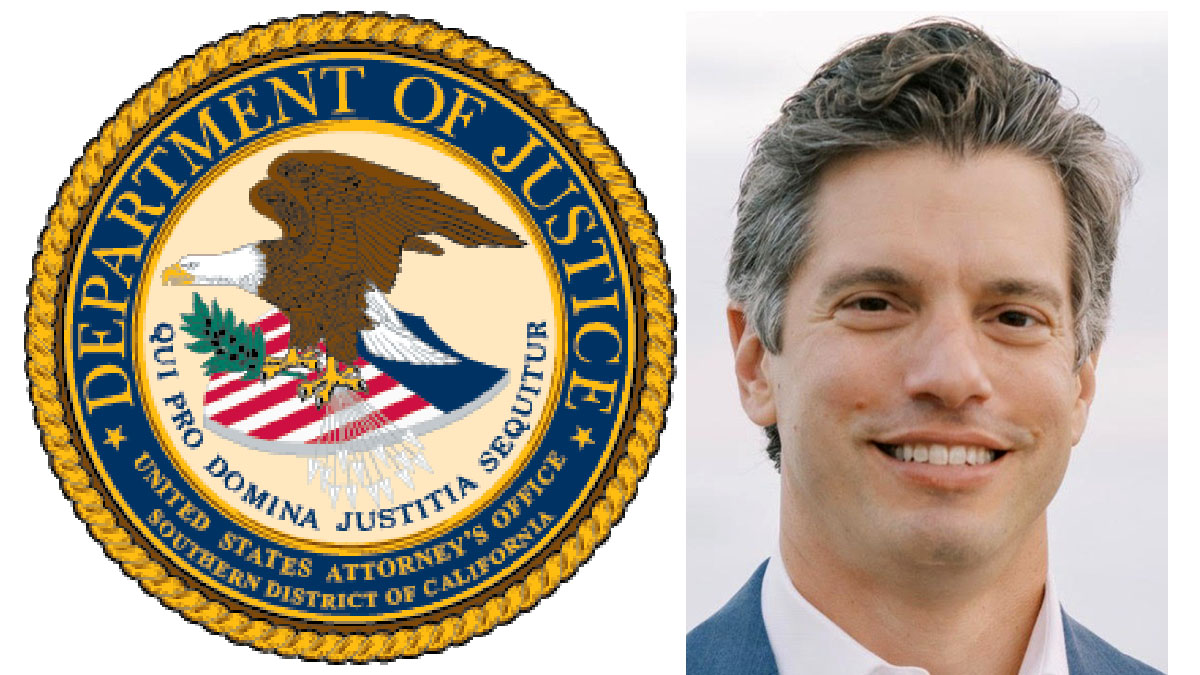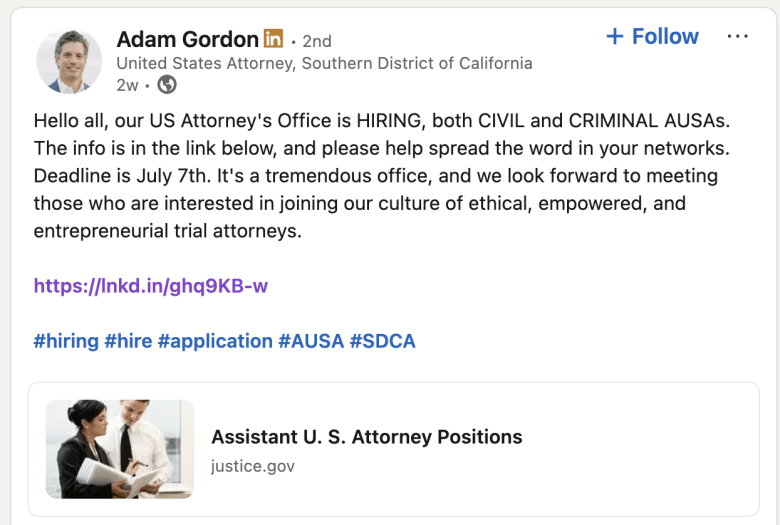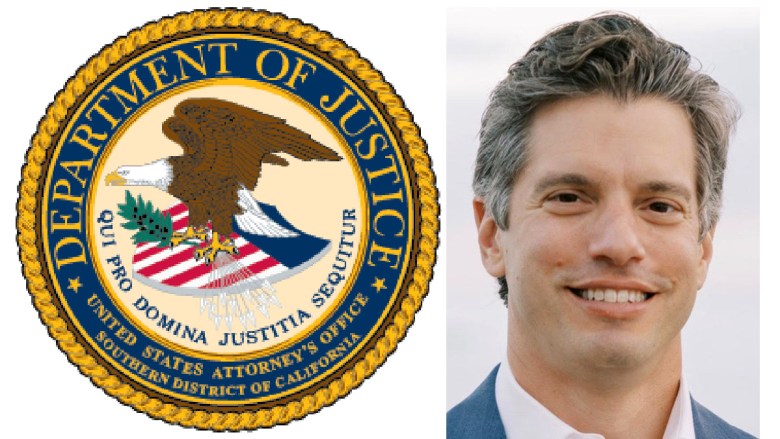 Acting U.S. Attorney Adam Gordon with seal of DOJ’s San Diego-Imperial office. (Times of San Diego photo illustration)
Acting U.S. Attorney Adam Gordon with seal of DOJ’s San Diego-Imperial office. (Times of San Diego photo illustration)
As many as 10 federal prosecutors in San Diego have quit under acting U.S. Attorney Adam Gordon, and other high-ranking lawyers have been demoted while the office struggles to fill vacancies, Times of San Diego has learned.
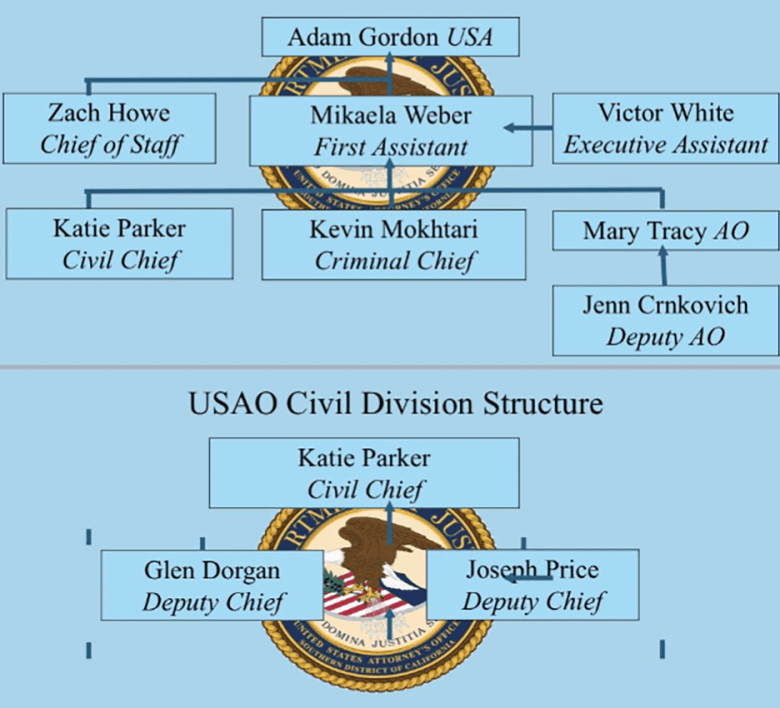 Organizational chart of senior San Diego DOJ officials, but already outdated since Katie Parker has left. (PDF)
Organizational chart of senior San Diego DOJ officials, but already outdated since Katie Parker has left. (PDF)
The alleged DOJ brain drain in the Southern District of California — like that seen at “Main Justice” in Washington — includes a veteran chief of the office’s national security section and a one-time U.S. attorney.
“If you were to take the people who had left, you’re talking about 80% of the senior more capable prosecutors in the office or civil attorneys,” said a longtime staffer who resigned before Donald Trump took office in January.
“I am disheartened by what is taking shape — the management that’s been put in place.”
Speaking on condition of anonymity, this longtime staffer said Gordon demoted at least one attorney for being friends with former U.S. Attorney Tara McGrath or her allies, calling this “open retribution.”
Another source said at least one colleague was demoted for helping prosecute January 6 insurrection cases.
In March, McGrath told Times of San Diego that investigators who typically work on national security or fentanyl abatement, as well as ATF agents targeting ghost gun makers, were spending less time on their specialties and more on immigration.
“That is 20% less of their time being devoted to public corruption, guardian complaints, national security, … human trafficking cases,” McGrath said at the time.
The longtime staffer’s account of recent developments was corroborated by others — but also challenged in part by two sources who also spoke on condition they not be named.
The veteran staffer told Times of San Diego that two-time acting U.S. Attorney Andrew Haden now toils on basic appeals cases. Haden had turned down Gordon’s offer to replace John Parmley, a 27-year veteran who the staffer said was removed as head of the national security and cybercrimes section.
“Andrew was offered the job as well as at least two other people,” the staffer said — citing Peter Ko and Jonathan Shapiro.
Haden and the others refused to take Parmley’s position as a show of support, the staffer suggested in a phone interview. Dale Blankenship eventually accepted that job.
(But another source said Parmley’s new role as senior litigation counsel is a prestige position in the office — “officially a mentor to half the Criminal Division.”)
Also reputedly demoted, at least briefly, was Dr. George Manahan, an Air Force surgeon before earning a degree from Harvard Law School. He’s expert in healthcare fraud.
The longtime staffer said Manahan — a friend of McGrath — won accolades at work, including Attorney of the Year for civil, before returning to the frauds section.
“There’s no one frankly better and now he is doing healthcare fraud because multiple people spoke out against his leaving the unit and what they got was a six-month reprieve,” the staffer said.
In February, the White House fired McGrath as the region’s top federal law enforcer. But on July 14, she began work for Perkins Coie — a major law firm battling Trump. McGrath will be a white collar and investigations partner in its San Diego office.
Application rejected?
Adam Alexander Gordon, 44 — elevated to U.S. attorney by Attorney General Pam Bondi in April — allegedly wasn’t picked at first to become an assistant U.S. attorney here.
The longtime staffer said a hiring committee rejected Gordon’s application before fellow Republican Bob Brewer brought him into the office in 2019. (Gordon in 2014 had been Brewer’s campaign manager in a failed bid for county district attorney.)
U.S. Attorney Gordon declined an interview request, and his spokeswoman wouldn’t comment on personnel matters — not even to tell me how many people work in the 880 Front Street office and who had left.
But a January 2025 “org chart” showed about 140 attorneys on the San Diego staff, including a small number of special assistant U.S. attorneys, or SAUSAs, on loan from other agencies.
Top prosecutors quit
Among those departing since January:
Valerie Chu, a 21-year veteran of the local DOJ office and now a senior appellate attorney with the California Court of Appeal. One colleague described her as “probably the preeminent healthcare fraud prosecutor in our area.” She’s also listed as an adjunct professor at Thomas Jefferson School of Law in San Diego.
Mark Conover, a former chief of the Major Frauds and Public Corruption Section who helped secure the conviction of U.S. Rep. Duncan Duane Hunter. In 2023, he won the Peter J. Mazza Outstanding Federal Lawyer Award from the San Diego chapter of the Federal Bar Association. He’s now a partner with Robbins Geller Rudman & Dowd LLP in San Diego.
Marietta Geckos, a 33-year federal attorney hailed on LinkedIn as a “mentor to multiple generations of attorneys at the U.S. Attorney’s Office, teaching them not only the substance of the work, but also the importance of being a worthy advocate for the United States.” She received a warm sendoff at a retirement party.
Sarah Goldwasser, who moved to San Francisco to work for BraunHagey & Borden LLP. Her bio says she investigated and prosecuted complex cases involving drug cartels, fentanyl traffickers, human smugglers and gun crimes over 2 1/2 years with the San Diego DOJ.
Peter Ko, who spent 27 years as a federal prosecutor in Nevada and San Diego, receiving the Attorney General’s Claudia J. Flynn Award for Professional Responsibility as well as the Director’s Award for Superior Performance. He’s now a partner in Robbins Geller Rudman & Dowd LLP’s San Diego office focused on “complex investigation, litigation, trial and appeals.”
Katherine “Katie” McGrath — an assistant U.S. attorney for nearly 10 years who served as the district’s Human Trafficking Coordinator, Elder Fraud Coordinator and Victims’ Rights Coordinator. She’s now a special counsel in the Business Trial Practice Group in Sheppard Mullin’s San Diego office.
Katherine Lind “Katie” Parker, former chief of the Civil Division Office in San Diego and past president of the University of San Diego’s School of Law alumni board, who left a few weeks ago. “Actually a big loss,” the longtime staffer said. The current organizational chart obtained by Times of San Diego doesn’t reflect her exit.
Ryan Sausedo, who spent over 10 years with the San Diego DOJ and “tried more than 15 cases to verdict and prosecuted a wide range of federal violations including transnational organized crime, international drug trafficking, money laundering, wire fraud, bankruptcy fraud and human trafficking,” according to his bio at the San Diego firm Caldarelli Hejmanowski Page & Leer.
Jaclyn Briana Stahl, whose LinkedIn profile says she investigated and prosecuted more than 200 cases over seven years involving international drug trafficking, sexual assaults and sex trafficking, fraud, bank robbery, customs violations and identity theft. She quit upon her return from “advising foreign governments across Africa on legislative, policy and institutional reforms to strengthen intellectual property protections and combat cybercrime.”
And Amy Bizhu Wang, who left the San Diego DOJ office and was admitted to the Alaska Bar in June. She’s now as assistant attorney general in the Office of Special Prosecutions of the Alaska Department of Law. In May, she won a conviction in a 1995 sexual assault.
Shortly after the November election, Fred Sheppard left the office as well. A 17-year DOJ veteran, he had been chief of the Criminal Division, Major Crimes Section and General Crimes Section. He now works for Sony Interactive Entertainment, “the company behind PlayStation,” according to his LinkedIn profile.
Owen Roth left in December after nearly a decade to join his wife’s law firm. His bio at Iredale & Roth said he’s been recognized by law enforcement and the U.S. Office of National Drug Control Policy HIDTA program “for his efforts combatting organized crime. During his time in the Justice Department, he was a ‘go-to’ prosecutor for some of the most important, complicated and sensitive investigations.”
Times of San Diego reached out to many of these people but rarely heard back.
The longtime staffer said Blair Cameron Perez was demoted as well. A retired captain in the Navy Reserve JAG Corps, Perez in 2016 helped create the federal Veterans Treatment Court to help veterans who had been injured while in the service.
Still in contact with some senior management, the longtime staffer said former colleagues call or text to ask, “Who do you think we should put on these cases?”
In a phone interview, former assistant U.S. attorney (AUSA) Roth told me that morale is extremely low in the San Diego office “and that the overall feeling seems to be that the department has lost its mandate to do justice … lost sight of its core principles.”
But Roth doesn’t blame Gordon, who he worked with in setting up the FAST unit to fight fentanyl sales. He said Main Justice’s mandate to focus on immigration cases has generated high stress in an already demanding job.
“To be an AUSA in San Diego is unlike being one in almost any other part of the country,” Roth said. “You have to be prepared essentially to work as an ER doctor in constant crisis mode because the cases come fast and furious.”
Although Roth doesn’t share Gordon’s politics, he praised the new chief. “I have absolutely nothing negative to say about Adam,” he said.
“Adam Gordon could have been chosen by any Republican president from the last, you know, 40 years. He’s got impeccable credentials. He has more than sufficient experience, and his ethics, his integrity, his commitment to the appropriate use of Justice Department — they’re all unquestionable.”
Gordon would never have been picked by a Democratic president, Roth said, but added, “So what?”
“I think that the San Diego community, given the choices that this administration has made for some of the [other] U.S. Attorneys Offices, sould be relieved,” he said.
Roth also pushed back on the notion Gordon benefited from his ties to Brewer. “I can also tell you that when Adam applied, there was a concern in the office that he was like ‘Bob’s guy’” Roth said.
But Brewer was “hands off about it,” Roth said. “It wasn’t a secret that Bob had affection for the guy. But Adam went through the hiring process. He interviewed. He was voted on by the hiring committee and when he got to the office, he did absolutely nothing to use his relationship with Bob for advancement.”
Gordon went to the new complaint section and handled Magistrate Court “like everybody else, and he waited his turn to be rotated to the next assignment group, which is being on a trial team in the general crime section, and he put in his time there and he took a job handling the opioid coordinators role.”
“Adam never once used his relationship with Bob to get ahead,” Roth said.
Roth still recommends the job to would-be applicants.
“On the one hand, you will learn more about how to be a trial lawyer in a faster period of time in San Diego than virtually anywhere else,” Roth said. “And on the other hand, the pressure on you to do the job right and to keep the cases moving is substantial.”
Another source said they were relieved that Gordon promoted staff from within — instead of hiring old law firm colleagues.
About three weeks ago, Gordon posted on his LinkedIn page:
“Hello all, our US Attorney’s Office is HIRING, both CIVIL and CRIMINAL AUSAs. The info is in the link below, and please help spread the word in your networks. Deadline is July 7th. It’s a tremendous office, and we look forward to meeting those who are interested in joining our culture of ethical, empowered, and entrepreneurial trial attorneys.”
But the longtime staffer said, “I know they’ve been trying to fill positions because they made a bunch of changes … and then after doing so realized that they didn’t have the bodies to actually effectuate the movement, which is why they keep asking for volunteers to help cover certain things in court.”
Another source told Times of San Diego that some resignations were linked to the ill-fated “Fat Leonard” prosecution, where a judge in that sprawling Navy bribery case faulted San Diego prosecutors for misconduct in handling of evidence.
This source said Chu and Conover left the office because of “Fat Leonard” burnout and “a feeling that they got hung out to dry.”
And a third source said some openings have been advertised since March with no hires.
Funding was yanked, this source said, adding that one person went for a final round interview but never heard back.
Buyouts under Elon Musk’s “fork in the road” plan were denied in the San Diego office because of staff shortages, according to multiple sources.
‘Never managed before’
The longtime staffer criticized “having people in senior leadership who’ve never managed before.”
Although the veteran staffer isn’t aware of Gordon ordering any cases dropped in San Diego, the extreme emphasis on immigration cases has been a concern.
“It’s more of just bringing cases that [we previously] probably just wouldn’t bring because the evidence is just not there,” the staffer said.
Besides the staff shortage, one Civil Division AUSA — David Wallace — has been flagged by the state Bar as being ineligible to practice law in California.
“Mr. Wallace is not eligible to practice law due to noncompliance with paying his annual attorney licensing fees, and for noncompliance with his Client Trust Account Protection Program reporting duties,” a Bar spokesman told me Tuesday. “These are two separate administrative (nondiscipline) actions and Mr. Wallace can become eligible again as soon as he complies.”
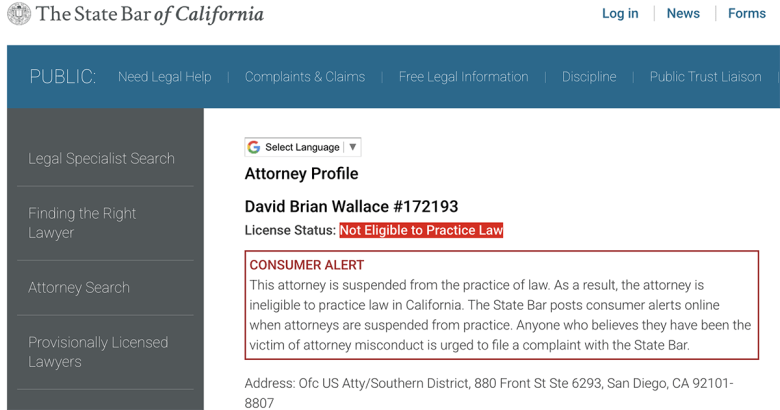 State Bar of California listing for David Wallace of the San Diego U.S. Attorney’s Office as of July 22, 2025.
State Bar of California listing for David Wallace of the San Diego U.S. Attorney’s Office as of July 22, 2025.
Wednesday morning, a spokesman for the San Diego office replied that Wallace is “not actively practicing law at this time due to medical circumstances.”
“As a result,” the spokesman said, “his bar license is in an inactive status. In the interest of protecting Mr. Wallace’s medical privacy, I am unable to provide further details.”
Under federal law, Gordon can serve as acting U.S. attorney for just 120 days — or until early August. After that, federal district judges in the region can appoint a U.S. attorney.
“In all likelihood,” The San Diego Union-Tribune reported, “the judges would appoint Gordon to continue serving in that role until Trump nominates a candidate — that could be Gordon or someone else — and the Senate confirms that candidate.”
Times of San Diego contacted the downtown federal court for the status of Gordon’s appointment but did not receive a response.
Job offers revoked
The longtime staffer said Gordon’s office has interviewed for new assistant U.S. attorneys but also revoked offers to “multiple people” including honors candidates who were judicial clerks in the San Diego district, “which certainly, you know, leaves a bad taste.”
“I know people, including a lot of judges, who are like: I would never recommend” that their law clerks apply to be AUSAs, the staffer said. “It was already getting hard quite honestly to get really quality candidates.”
Where once hundreds applied for every position, “it’s down to dozens and just keeps going down as [does] the experience and qualifications,” the staffer said.
Politics may play a role.
When Gordon — before being elevated to acting head of the office — left town in January, “he put [a note] on the outside of his door that he was going to the inauguration of Donald Trump,” the staffer said.
He said colleagues who needed information on his cases were told: “Reach back to me after January 20th.”
I sought comment from the local chapter of the Federal Bar Association but didn’t hear back.
Harry Litman’s take
La Jolla’s Harry Litman was once a deputy assistant attorney general under Janet Reno and served as U.S. attorney in the Western District of Pennsylvania.
Now a political commentator on legal issues with a podcast and regular TV appearances, Litman shared his thoughts on the San Diego DOJ brain drain.
“This seems to be happening in office after office and whole divisions at Main Justice as well,” he said Tuesday via email. “We don’t know yet how widespread the damage, but anecdotal reports that emerge suggest it’s enormous and very possibly irreversible.”
Speaking generally about the Justice Department, he said: “The norms and principles that career prosecutors take as their blueprint have been erased or violated with impunity.”
Noting the loss of highly experienced prosecutors, Litman said: “Many U.S. Attorney’s Offices have a small cadre of key figures who provide advice and a sense of continuity to younger prosecutors. When those people leave or forced out, there is an outside impact on the work of the office.”
He concluded by quoting the memo Maurene Comey wrote to DOJ colleagues after she apparently was fired for her role in the Jeffrey Epstein prosecution.
Litman said the Comey case “speaks volumes about the attitude within the offices of the Bondi/Trump crowd, including their willingness to shade or ignore the truth.”
Comey wrote: “If a career prosecutor can be fired without reason, fear may seep into the decisions of those who remain. Do not let that happen. Fear is the tool of a tyrant, wielded to suppress independent thought.
“Instead of fear, let this moment fuel the fire that already burns at the heart of this place. A fire of righteous indignation at abuses of power. Of commitment to seek justice for victims. Of dedication to truth above all else.”
Have a tip? Contact contributing editor Ken Stone and ask for his Signal number.
